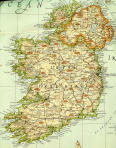 War and Independence War and Independence
The War between Britain
and Germany started in 1914. It went on for 4 years. Over a quarter of a million
Irishmen fought in the war.
Plans for a Rising
 Most Irish people supported Britain
in the war, but some saw that the war gave a chance for Ireland to gain its
freedom from Britain. Roger casement went to Germany to get guns and ammunition.
The Rising was to happen on the Easter weekend, 1916. The ship with casement
aboard was captured, and he was arrested. Most Irish people supported Britain
in the war, but some saw that the war gave a chance for Ireland to gain its
freedom from Britain. Roger casement went to Germany to get guns and ammunition.
The Rising was to happen on the Easter weekend, 1916. The ship with casement
aboard was captured, and he was arrested.
The 1916 Rising
 Some wanted to call off the Rising, but others such as
Patrick Pearse and James Connolly wanted to go ahead. About 1,000 men marched
through the streets of Dublin
and took over many of the buildings. They made the General Post Office their
headquarters and they put the tricolour up outside the building. Some wanted to call off the Rising, but others such as
Patrick Pearse and James Connolly wanted to go ahead. About 1,000 men marched
through the streets of Dublin
and took over many of the buildings. They made the General Post Office their
headquarters and they put the tricolour up outside the building.
End of the Rising
 At first, the British were taken by surprise. Then,
they sent troops over from England.
The fighting went on for 5 days. A gunboat was brought up the Liffey and it
fired shells into O’Connell Street.
By Saturday, the centre of Dublin was in ruins. Pearse and his men surrendered.
The British government sentenced the leaders to death. 15 of them were shot.
Casement was hanged. At first, the British were taken by surprise. Then,
they sent troops over from England.
The fighting went on for 5 days. A gunboat was brought up the Liffey and it
fired shells into O’Connell Street.
By Saturday, the centre of Dublin was in ruins. Pearse and his men surrendered.
The British government sentenced the leaders to death. 15 of them were shot.
Casement was hanged.
Sinn Féin
 Many Irish people did not support the rising, but they
were shocked when they heard that the leaders had been killed. The Sinn Féin
party got lots of support because of the killings. Sinn Féin members of
parliament would not go to England,
but they set up their own parliament in the Mansion House in 1919. They called
it Dáil Éireann. Éamonn de Valera was its first leader and Michael Collins
took charge of the Irish Republican Army (IRA). There was fighting for nearly 2½
years until both sides agreed to stop. Many Irish people did not support the rising, but they
were shocked when they heard that the leaders had been killed. The Sinn Féin
party got lots of support because of the killings. Sinn Féin members of
parliament would not go to England,
but they set up their own parliament in the Mansion House in 1919. They called
it Dáil Éireann. Éamonn de Valera was its first leader and Michael Collins
took charge of the Irish Republican Army (IRA). There was fighting for nearly 2½
years until both sides agreed to stop.
 The
Irish
Free State The
Irish
Free State
After a lot of talking and arguing, between the Irish
and the British, it was agreed that Ireland
would have its own parliament. It would be called the . However, 6 counties in the north of Ireland
would remain under British rule.
Civil War
 Many people were upset that the whole country was not
free from British rule. Irish people now started to fight among themselves. This
was called a Civil War. Michael Collins was killed in Cork.
Over 6,000 people were killed in the fighting. Many people were upset that the whole country was not
free from British rule. Irish people now started to fight among themselves. This
was called a Civil War. Michael Collins was killed in Cork.
Over 6,000 people were killed in the fighting.
Irish Republic
 The first Irish government lasted for 10 years. Then Éamonn
de Valera’s party (Fianna Fáil) came into power in 1932. In 1937, many of the
links with Britain
were cut. A president, Douglas Hyde, was elected to take the place of the King
of England as head of state. In 1949, Ireland became known as the Republic. The first Irish government lasted for 10 years. Then Éamonn
de Valera’s party (Fianna Fáil) came into power in 1932. In 1937, many of the
links with Britain
were cut. A president, Douglas Hyde, was elected to take the place of the King
of England as head of state. In 1949, Ireland became known as the Republic.
Contact Us
|